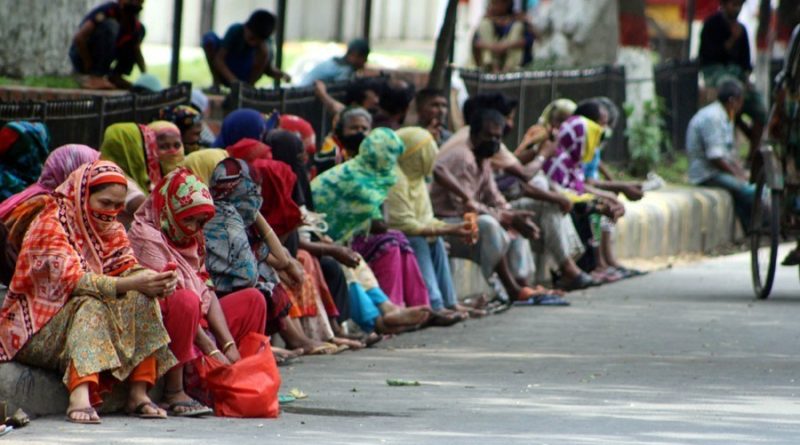Nearly one in five Bangladeshi households faced financial crises between May 2024 and April 2025, according to a new study, amid challenges stemming largely from excessive medical expenses, loan repayments, education-related costs, and other unavoidable expenditures.
The findings, unveiled at a webinar on Monday, shed light on the psychological and economic pressures gripping families in the aftermath of last year’s political transition.
The study also revealed deep frustrations with corruption and governance failures.
Almost three-quarters of respondents said that “nothing works without money” when trying to access services, underscoring the persistence of bribery and harassment despite public expectations of reform following the July 2024 mass uprising.
Other crises included natural disasters (7.0 per cent), police or court-related issues (2.3 per cent), family disputes (1.7 per cent), and miscellaneous problems (1.0 per cent).
Economist and Executive Chairman of the Power and Participation Research Centre (PPRC), Dr Hossain Zillur Rahman, presented the findings at a webinar titled “Unpacking the Mood at the Household Level”, which was part of PPRC’s public policy dialogue series ‘Ajker Agenda’.
It highlighted key insights from the study “State of the Real Economy: Household Realities and Policy Options Towards Strengthening Economic Democracy”, which was released late last month.
Speakers at the event included President of the Bangladesh Enterprise Institute (BEI) and former Ambassador Humayun Kabir, socio-political analyst and writer Altaf Parvez, independent journalist and doctoral fellow at Georgia State University, USA, Asif Bin Ali, and Bhuiyan M Asaduzzaman, researcher at the Dacca Institute of Research & Analytics (DAIRA).
Presenting the keynote, Dr Rahman said that one of the study’s objectives was to assess the psychological conditions of households.
“Nearly one-fifth of families have experienced a financial crisis,” he said, adding that households also reported crises relating to loan repayment (27 per cent), education (8.3 per cent), migration (6.5 per cent), and legal issues (5.9 per cent).
Highlighting harassment across sectors, largely due to weak governance, he noted: “Corruption is one of the major diseases of the country, and political discussions also emphasise this.”
Among respondents, nearly 75 per cent agreed that “nothing works without money” to obtain services, 36.4 per cent cited excessive or complicated rules, and 22.3 per cent pointed to unclear service pathways.
“Nearly three-fourths say nothing works without money. This, however, points to a deeper issue-systemic and institutional malaise within the state,” Dr Rahman observed.
The study further showed that over 52 per cent of households reported paying bribes at government offices before August 2024, a figure that dropped to about 47 per cent afterwards. Specifically, 8.54 per cent of household members said they had paid bribes before August, compared to 3.69 per cent afterwards.
Ambassador Humayun Kabir noted that BEI had also conducted studies and field visits in recent years to examine corruption and governance issues.
Expressing frustration over the lack of progress, he said: “People had strong expectations after the mass uprising last July-that there would be significant change in their relationship with the administration and service providers.”
“We have seen through our observations that people do not feel corruption has declined. They believe it remains almost the same as before, and this deeply troubles them,” he added.
Referring to visits across more than 20 districts, Kabir said: “Everywhere, people told us corruption makes their lives miserable. Many of their problems remain unsolved because unless they pay significant amounts of money, nothing gets done.”
However, he emphasised the resilience and aspirations of the people. “Among South Asian nations, I do not see any people with a more resilient and fighting spirit than Bangladeshis,” he said, citing the contributions of over 15 million non-resident Bangladeshis sending remittances home.
Socio-political analyst Altaf Parvez argued that the social fabric has deteriorated over the years, with growing indifference, hostility, and cycles of resentment within communities.
“After the mass uprising, efforts were needed to rebuild unity and foster a shared sense of citizenship, but instead a top-down, conflict-driven approach has spread through society,” he observed.
On the culture of harassment, he said: “From my observation, the main causes are the absence of effective local government and the weak presence of the national government.”
Independent journalist Asif Bin Ali noted that while household digitalisation has progressed, it has not translated into improved youth employment or household incomes, and debt burdens continue to rise.
“The political changes and aspirations we have seen over the past few years, including the July movement, have not yet translated into household economic benefits,” he said.
He added that there has been no meaningful discussion on how these political changes could be turned into tangible economic gains for ordinary people.






